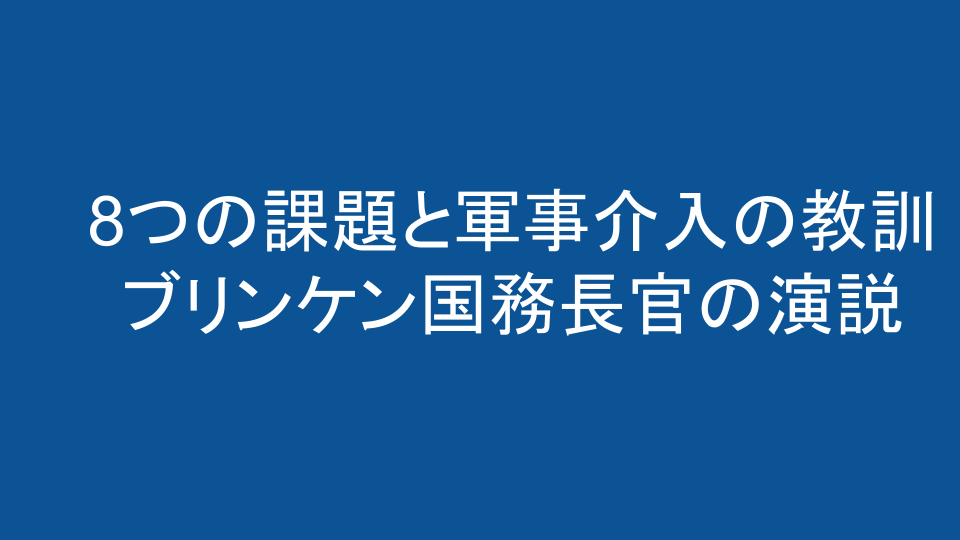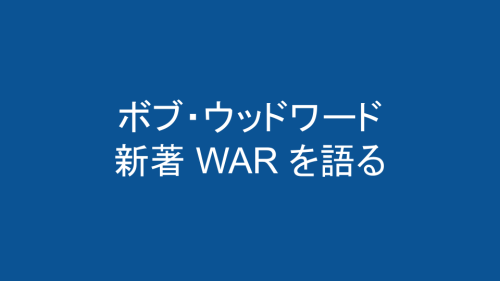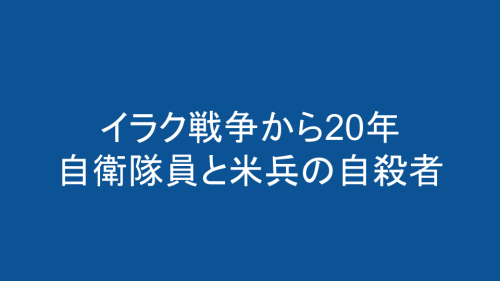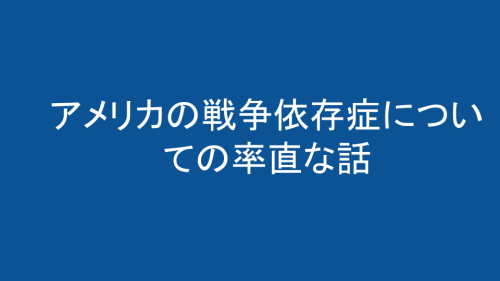バイデン政権が国家安全保障戦略に取り組む際の指針
バイデン大統領が2021年3月3日、国家安全保障戦略の暫定的な指針を発表しました。
この指針について、ホワイトハウスは次のように説明しています。
This interim guidance has been issued to convey President Biden’s vision for how America will engage with the world, and to provide guidance for departments and agencies to align their actions as the Administration begins work on a National Security Strategy.
The White House Interim National Security Strategic Guidance MARCH 03, 2021
この暫定的な指針は、アメリカの世界との関わり方についてバイデン大統領のビジョンを提示し、政権が国家安全保障戦略に取り組む際に各部局がそれに沿った取り組みができるよう指針を示すために公表されたものである。
ブリンケン国務長官が説明する8つの外交課題
この指針の公表にあわせて、アントニー・ブリンケン国務長官が同日、「A Foreign Policy for the American People」(アメリカ国民のための外交政策)と題する演説を行いました。
映像:A Foreign Policy for the American People
演説では、先述の指針を踏まえたうえで、バイデン政権の外交政策の喫緊の課題について次の8つの事項が取り上げられています。
First, we will stop COVID-19 and strengthen global health security.
コロナの感染を抑え、世界的な医療に関わる安全保障を強化する。
Second, we will turn around the economic crisis and build a more stable, inclusive global economy.
経済危機を好転させ、より安定した包括的な世界経済を築く。
Third, we will renew democracy, because it’s under threat.
脅かされている民主主義を再生する。
Fourth, we will work to create a humane and effective immigration system.
人道的で効果的な移民制度を創設する。
Fifth, we will revitalize our ties with our allies and partners.
同盟国や友好国との関係を再活性化する。
Sixth, we will tackle the climate crisis and drive a green energy revolution.
気候変動の危機に取り組み、グリーンエネルギー革命を推進する。
Seventh, we will secure our leadership in technology.
テクノロジー分野における米国の主導権を確実なものにする。
And eighth, we will manage the biggest geopolitical test of the 21st century: our relationship with China.
21世紀最大の地政学的試練となる中国との関係を管理する。
ということで、演説はそれぞれの喫緊の外交課題について簡潔な説明が付されていきます。
冷戦後今日に至る米国の軍事介入を自制的に振り返る
さらにブリンケン国務長官のこの演説では、冷戦終結後今日に至るまでの数十年にわたる米国の軍事介入が自省的に振り返られていきます。
And finally, as the President has promised, diplomacy – not military action – will always come first.
最後に、大統領が約束したように、軍事行動ではなく、外交が常に第一だ。
Again, this is shaped by hard lessons learned. Americans are rightly wary of prolonged U.S. military interventions abroad. We’ve seen how they’ve often come at far too high a cost, both to us and to others.
このことは、これまでに学んだつらい教訓によって得られたものだ。アメリカ国民はまさに、海外での長引く軍事介入に慎重な姿勢を示している。そうした軍事介入がしばしば、アメリカや他国にとってあまりにも大きなコストとなることを我々は経験してきた。
When we look back at the past decades of our military involvement in the world, especially in Afghanistan and the Middle East, we must remember what we’ve learned about the limits of force to build a durable peace; that the day after a major military intervention is always harder than we imagine; and how critical it is to pursue every possible avenue to a diplomatic solution.
過去数十年にアメリカが世界で関わった軍事介入、特にアフガニスタンと中東でのそれを振り返れば、我々は次のことを覚えておかなければならない。すなわち、しっかりとした平和を築くうえで軍事力には限界があることを経験したこと、大きな軍事介入の後には常に想像以上に厳しい現実があること、そして、外交的解決に向けたあらゆる可能性の道を追求することが重要であることだ。
Of course, we will never hesitate to use force when American lives and vital interests are at stake.
アメリカ国民の命と国益が危険にさらされている時にはもちろん、アメリカは軍事力を使うことをためらわない。
That’s why President Biden authorized an airstrike last week against Iranian-backed militia groups targeting U.S. and coalition forces in Iraq.
バイデン大統領が先週、イラクの米国および連合国の軍を標的とした、イランが支援する武装グループに対し、空爆を許可したのはそのためだ。
But in that case – and in future cases when we must take military action – we will do so only when the objectives and mission are clear and achievable, consistent with our values and laws, and with the informed consent of the American people.
しかし、軍事力を行使しなければならないそうした状況において、また将来のそのような場合において、アメリカは、目的と使命が明らかかつ達成可能で、米国の価値観と法に合致した場合においてのみ、アメリカ国民に状況をよく説明し同意を得たうえでそのような行動をとるであろう。
And we’ll do it together with diplomacy.
アメリカは外交努力とあわせてそうした行動をとるであろう。
ということで、冷戦終結後、とりわけ21世紀に入って米国がとってきた軍事介入を伴う海外での国家再建の政策は、バイデン政権において自省的に評価されていることが見てとれます(トランプ政権も考え方としては同様であったと思います)。
なお、冒頭で紹介したバイデン政権の国家安全保障戦略の暫定的な指針については、次回以降の当ブログにおいて、あらためてそのポイントを確認してみたいと思っています。








